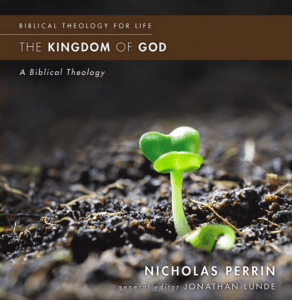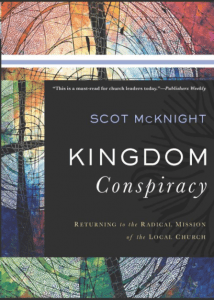 A kingdom is a people ruled by a king just as an empire is a people ruled by an emperor.
A kingdom is a people ruled by a king just as an empire is a people ruled by an emperor.
The character of the king determines the character of the kingdom just as the character of the emperor determines the character of the empire. We know the stories of ruthless emperors or at least the ruthless acts of emperors who are more or less authorized by military force (from Augustus to Hitler and Stalin). That ruthlessness impacts the people of the empire both toward fear and to the use of ruthless force.
It is noteworthy that Jesus chose the term kingdom for his people; it is noteworthy that Jesus redefined king in his parables and in his teachings and in his own way of life.
But the character of Jesus redefines the character of a Jesus-kingdom. Too often kingdom people today opt for the empire’s ways and create an empire character where there is to be a Jesus-kingdom character. Maybe the biggest disappointment many have today about the church is that it has too much empire culture. Maybe the biggest reason many opt for kingdom against church is because kingdom evokes the character of Jesus to them.
What needs to happen first to create a Jesus character-shaped kingdom culture?
One can summarize the character of King Jesus by looking at Mark 10:35-45 or at Philippians 2:6-11 to see that Jesus’ character is thoroughly cruciform: the one who lived is the one who gave himself for others in sacrifice so that others might live. His rule follows that kind of life, death and resurrection.
Three titles interpret Jesus’ character for us: Son of Man, Son of God, Messiah. Each tells the same story: the one who now rules is the one who lived and gave himself for others. Any talk of “incarnational” ministry or “incarnational” missional living must then take the full story of Jesus into consideration. From Kingdom Conspiracy:
My contention is that the three titles we explored—Son of Man, Son of God, and Messiah—are not only the three central titles for Jesus in the Gospels, but they are each a variation on the same theme in the kingdom story. Each tells the story of Jesus as one who is sent by God to bring fulfillment to Israel’s story by reclaiming the rule of God in this world. Each tells the story of Jesus’ full life: he was born of a virgin, lived a very Jewish life, declared the kingdom with himself at the center, formed a group of followers, died both as a victim of injustice and as an act of God to end injustice by dying the death of others, and was raised to the right hand of the Father to rule. Nothing less will do. More important, until we get the fullness of this story on the table, kingdom mission will be sold short. When we do, we learn that mission is actually not the first word, but Christ is; we gain a new understanding of evangelism; we discover that genuine kingdom mission is cruciform, shaped by and toward the cross; and we also are reformed into the hope of the kingdom. All these flow directly from seeing the first word as Jesus (135).
I see a few illustrations of reducing christology and therefore reducing mission and therefore distorting the character of the kingdom:
Jesus reduced to Prophet turns Christians against the world and often enough one another and it centralizes justice concerns into the wholeness of the mission. Good, but not the whole life and not the whole character.
Jesus reduced to Savior turns the gospel into Good Friday only, the message of the gospel into nothing but salvation, and the church’s mission is reduced to evangelism. Abandoning catechesis the church becomes a club for the saved. Good, but not the whole life and not the whole character.
Jesus reduced to Teacher turns Christians into moralists or into people marked by specific behaviors — from not drinking to being pacifists to being social instruments of moral or social improvement. Good, but not the whole life and not the whole character.
But a full life of Jesus creates a culture shaped by character of the king. Let us then say that this kind of culture-making shaped by the king’s character leads to an “incarnational” missional life:
Kingdom mission is grounded in kingdom Christology, and the heart of Christology is the incarnation, God-become-human. Some early great theologians framed incarnation and its impact this way: he became what we are so we could become what he is. Athanasius said the same in a much more provocative way: “For he was made man that we might be made God.” I’d rather not try to unravel those words of Alexandria’s famous theologian but instead draw his words into our discussion: Kingdom Christology is incarnational, and, since Christology shapes kingdom, kingdom mission is incarnational. We are to learn to avoid using the word “incarnation” cheaply. God alone is incarnate in Jesus Christ. God becomes what we are. We cannot become what others are in the way God did. God ontologically enters into our condition so that he is completely identified with us. We mimic the incarnation when we enter into the condi- tions of others in order to mediate redemption so that they can enter into the conditions of the kingdom. Our “incarnation” is the human attempt to go where God went, so that we can mediate where God wants people to go.
But there is more to it than “becoming what we are,” because the “what we are” was dead and sinful. So the “becoming” is a becoming-sin and an entering-death. If we want to be accurate about “incarnation,” we have to define it as becoming death in order to bring life. In a shorter formula, incarnation means dying in order to bring someone else life.
In the general and more defined sense, then, kingdom mission must be incarnational. We, too, must leave in order to lead others to find God; we, too, must become what others are in order to help them to become what God wants for them; and we, too, are to morph in order to guide others into kingdom transformation. We must die so that others may live (138).
A church is designed by God to be this kind of incarnational missional way. We sell the kingdom’s character short when we sell the king’s character short.














